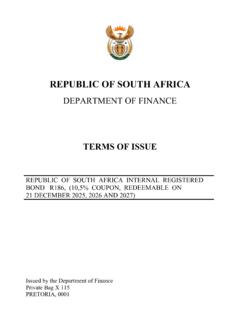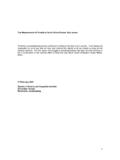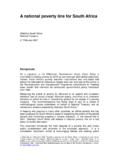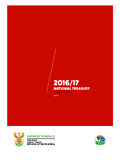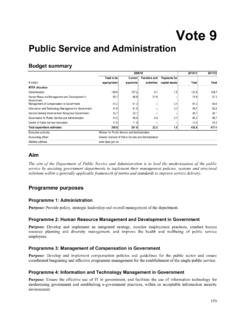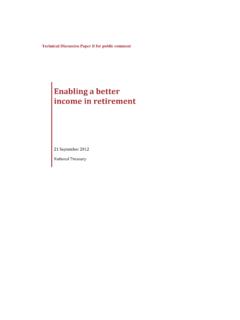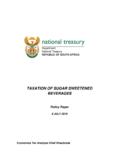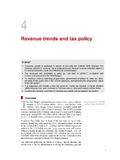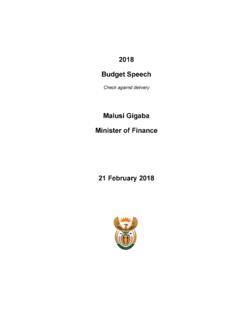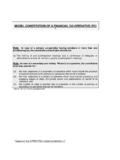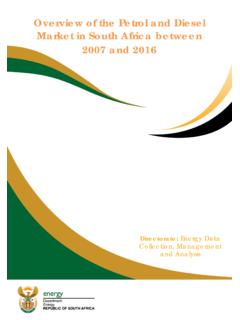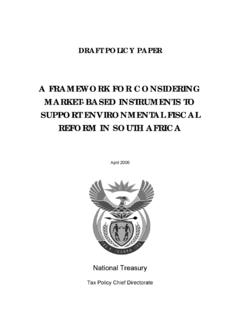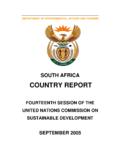Transcription of National Treasury Republic of South Africa
1 Budget Review 2016 National Treasury Republic of South Africa 24 February 2016 ii ISBN: 978-0-621-44245-8 RP: 16/2016 The Budget Review is compiled using the latest available information from departmental and other sources. Some of this information is unaudited or subject to revision. To obtain additional copies of this document, please contact: Communications Directorate National Treasury Private Bag X115 Pretoria 0001 South Africa Tel: +27 12 315 5944 Fax: +27 12 407 9055 The document is also available on the internet at: iii iii iv iv v v vi vii Foreword The 2016 Budget has been prepared in a very tough economic environment. The global outlook for economic growth is subdued, weighed down by a prolonged slump in commodity prices and slower growth in China. There is a pronounced slowdown in developing countries, with some in deep recession.
2 South Africa s low savings rate makes the country vulnerable to external shocks, as do domestic structural weaknesses. Domestic growth forecasts over the medium term government s three-year budgeting window have been revised down. A tax revenue shortfall of R4 billion is expected for 2015/16 compared with the most recent forecast in October 2015. In an environment of rising inflation, higher debt and debt-service costs, and increasing public-sector wages, slow revenue growth threatens to widen the budget deficit, diminishing government s capacity to meet the targets of the National Development Plan. Government is under no illusions about the challenges we face. There is no easy road ahead. Accordingly, the 2016 Budget sets out a more rapid fiscal consolidation to return the public finances to a sustainable path. At the same time, we are supporting the structural reforms and economic transformation needed to achieve and sustain far higher levels of growth in the economy.
3 Our country s strengths will stand us in good stead over the next several years. South Africa has deep and liquid capital markets. Macroeconomic policy is prudent and transparent. The institutional environment established under the Constitution from the courts to the Auditor General ensures that both public and private institutions are subject to scrutiny and accountability. Our proximity to growing African markets continues to provide opportunities to expand investment and exports. The Budget proposes to add R48 billion to tax revenue by providing limited relief for fiscal drag and increasing the fuel levy, excise taxes and the effective capital gains tax rate, as well as additional revenue measures to be outlined in future budgets. The expenditure ceiling has been reduced by R25 billion over the medium term by targeting compensation budgets of National and provincial government.
4 To respond to new spending needs in higher education, drought relief and its multilateral development commitments, government has reprioritised billion. Spending on core social and economic programmes has been protected, and measures to improve spending efficiency instituted. These proposals will close the budget deficit more rapidly than announced in the 2015 Medium Term Budget Policy Statement, stabilising debt at per cent of GDP in 2017/18. Government is committed to meeting these targets and will take additional steps to do so as required. Crucially, government recognises that it cannot address South Africa s economic and development challenges alone. Over the period ahead, we intend to markedly increase active collaboration with business, labour and civil society to bolster the resilience of the economy. Government will partner with the private sector to co-invest in infrastructure and skills development.
5 Investments in additional power-generating capacity and independent power producers will increase electricity supply and improve reliability. Over the next three years, public-sector infrastructure investment will total billion. I would like to thank Cabinet, Parliament s finance portfolio committee, the Ministers Committee on the Budget and former Minister of Finance Nene for their leadership. I am also grateful to Minister Gordhan whose return to the finance portfolio gave the country a welcome shot in the arm and to Deputy Minister Jonas. I extend thanks to my colleagues throughout government for their diligence, thoughtfulness and collaboration in tackling tough issues in a challenging budgeting environment. Finally, I acknowledge my hard-working colleagues in the National Treasury , who remain steadfast in their commitment to the constitutional obligations of this department.
6 Lungisa Fuzile Director-General: National Treasury viii ix Contents Chapter 1 A resilient South Africa making hard choices in difficult times .. 1 Overview .. 1 A protracted global slowdown .. 2 Fiscal consolidation and inclusive growth .. 4 Overview of the 2016 Budget .. 8 Conclusion .. 12 Chapter 2 Economic overview .. 13 Overview .. 13 Global economic outlook .. 14 The South African economy .. 15 Charting a path to higher growth .. 23 Summary .. 28 Chapter 3 Fiscal policy .. 29 Overview .. 29 Securing fiscal sustainability .. 30 Risks to the fiscal outlook .. 33 Fiscal framework .. 33 Elements of the consolidated budget .. 34 Debt 37 Chapter 4 Revenue trends and tax proposals .. 39 Overview .. 39 Medium-term tax policy considerations .. 40 Revenue collection and outlook .. 43 Tax proposals .. 46 Reducing red tape for small business .. 53 Summary.
7 53 Chapter 5 Consolidated spending plans .. 55 Overview .. 55 Revisions to spending plans .. 56 Consolidated government expenditure .. 59 Medium-term spending and the .. 61 Chapter 6 Division of revenue and spending by provinces and municipalities .. 75 Overview .. 75 Division of revenue .. 76 Provincial revenue and spending .. 77 Municipal revenue and 80 Summary .. 84 Chapter 7 Government debt and contingent liabilities .. 85 Overview .. 85 Medium-term borrowing strategy .. 88 Debt and other government obligations .. 92 Summary .. 95 Chapter 8 Financial position of public-sector institutions .. 97 Overview .. 97 Financial overview .. 99 Social security funds .. 107 Government Employees Pension Fund .. 109 Summary .. 109 x Annexure A Report of the Minister of Finance to Parliament .. 113 Annexure B Public-sector infrastructure update .. 127 Annexure C Additional tax policy and administrative adjustments.
8 139 Annexure D Financial sector regulation and reform .. 169 Annexure E Summary of Budget .. 175 Glossary .. 179 Statistical tables .. 197 Two annexures are available on the National Treasury website ( ): W1 Explanatory memorandum to the division of revenue W2 Structure of the government accounts xi Tables Macroeconomic outlook summary .. 8 Consolidated government fiscal framework .. 9 Summary of tax proposals .. 10 Consolidated government expenditure by function .. 10 Division of revenue .. 11 Projected state debt and debt-service costs .. 12 Annual percentage change in GDP and consumer price inflation in selected regions/ countries .. 14 Macroeconomic performance and Projections .. 17 Components of the financial account .. 22 Sector multipliers .. 24 Macroeconomic performance and projections .. 30 Consolidated fiscal framework .. 31 Consolidation 31 Expenditure ceiling.
9 32 Consolidated operating and capital accounts .. 34 Main budget 35 Revisions to main budget revenue and expenditure estimates .. 36 National government debt-service costs .. 37 Consolidated budget balance .. 37 Public-sector borrowing requirement .. 38 Tax burden and tax rate in selected countries .. 41 Tax revenue performance .. 43 Budget estimates and revenue outcomes .. 44 Budget 45 Impact of tax proposals on 2016/17 revenue .. 46 Personal income tax rate and bracket adjustments .. 47 Estimates of individual tax payers and taxable income .. 47 Transfer duty rate adjustments .. 50 Total combined fuel taxes on petrol and diesel 51 Changes in specific excise duties .. 53 Additional spending to be funded in the 2016 MTEF .. 57 Baseline reductions by sphere of government . 58 Consolidated government expenditure by economic classification.
10 61 Consolidated government expenditure by function .. 62 Health expenditure .. 63 Social protection expenditure .. 64 Social grants values .. 65 Post-school education and training expenditure 66 Basic education expenditure .. 67 Economic affairs expenditure .. 69 Human settlements and municipal infrastructure70 Agriculture, rural development and land reform 71 Defence, public order and safety expenditure .. 72 General public services expenditure .. 73 Division of nationally raised revenue .. 76 Provincial equitable share .. 78 Conditional grants to provinces .. 79 Transfers to local government .. 84 Ownership of domestic government bonds .. 86 Performance against strategic portfolio risk 87 Financing of National government borrowing requirement .. 88 Domestic short-term borrowing.
